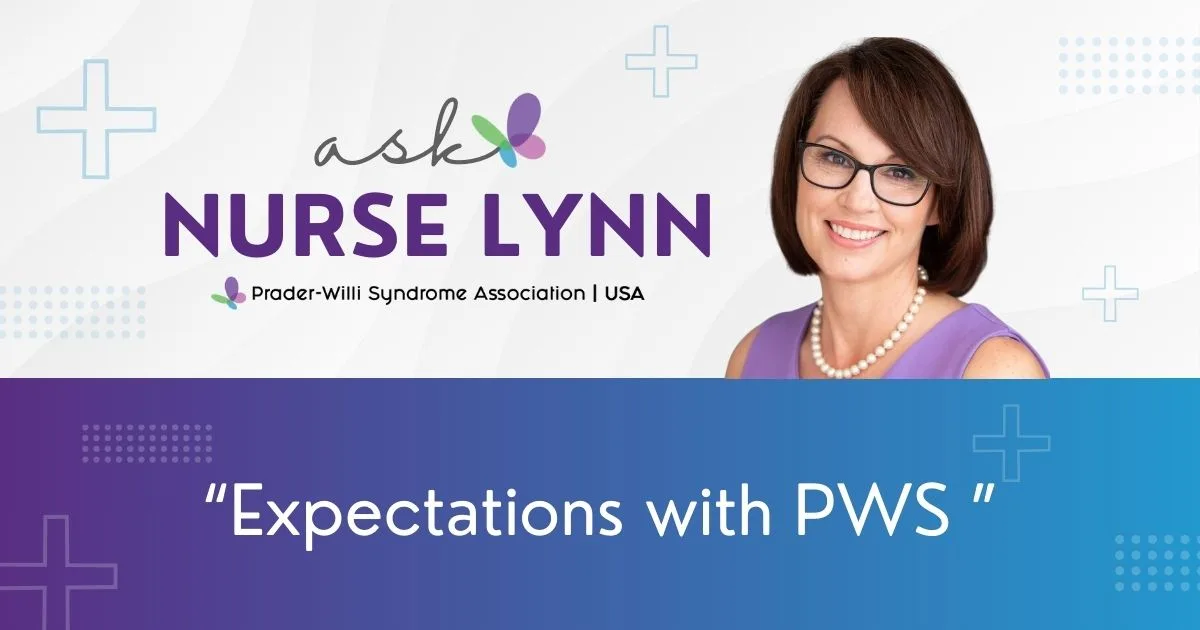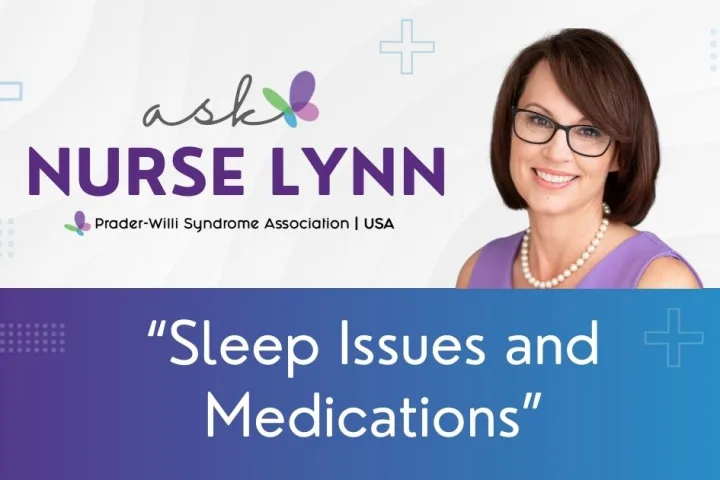Question:
Female, 1 month old, unknown subtype
My baby is 1 month old, and the diagnosis showed Prader-Willi. I want to ask if there are people with mild symptoms and also if there are people who are independent. Can a person be diagnosed with Prader Willi but live a normal life?
Nurse Lynn Response:
Thank you so much for reaching out and, congratulations on the birth of your precious child. I understand that this diagnosis feels overwhelming, and it’s completely normal to have many questions and uncertainties in these early days.
To answer your questions, yes, Prader-Willi Syndrome is a spectrum disorder, which means that the symptoms can vary significantly from one individual to another. Some people with PWS may experience milder symptoms and go on to be more independent as they grow, although this can look different for everyone. This is not unlike people without PWS- we all have different areas that we need support from others. Early interventions, such as therapies and a strong support network, can play a huge role in helping a child with PWS reach their fullest potential. It’s wonderful to see that you’re already seeking out resources, like PWSA|USA, as this proactive approach will be invaluable in supporting your child’s development.
While PWS presents unique challenges, it’s also important to note that individuals with PWS lead fulfilling lives and achieve different levels of independence with the right support. However, it’s also crucial to recognize that PWS is a lifelong condition, and the journey will be different for each child. Staying in close communication with your healthcare team, including geneticists, endocrinologists, and developmental specialists, will be vital in tailoring care to your baby’s specific needs. Focusing on what is possible, rather than what may be uncertain, is a helpful mindset to have — though I know it can be hard at times.
This is an exciting time in the PWS community with new therapeutics nearing approval. We all are hopeful that these advancements will help individuals with PWS become more independent, healthier, and live fuller lives.
I know it may feel uncertain now, but please know that you are not alone, and there are so many families and communities with shared experiences that can offer support along the way. If you’d like, I can help connect you with others or share more about early interventions that might be beneficial.
Sending strength to you and your little one as you navigate this journey. Don’t hesitate to reach out if you have more questions or just need to talk.
Do you have a question for Nurse Lynn? Submit your question here:
Share this!





 Perry A. Zirkel has written more than 1,500 publications on various aspects of school law, with an emphasis on legal issues in special education. He writes a regular column for NAESP’s Principal magazine and NASP’s Communiqué newsletter, and he did so previously for Phi Delta Kappan and Teaching Exceptional Children.
Perry A. Zirkel has written more than 1,500 publications on various aspects of school law, with an emphasis on legal issues in special education. He writes a regular column for NAESP’s Principal magazine and NASP’s Communiqué newsletter, and he did so previously for Phi Delta Kappan and Teaching Exceptional Children. Jennifer Bolander has been serving as a Special Education Specialist for PWSA (USA) since October of 2015. She is a graduate of John Carroll University and lives in Ohio with her husband Brad and daughters Kate (17), and Sophia (13) who was born with PWS.
Jennifer Bolander has been serving as a Special Education Specialist for PWSA (USA) since October of 2015. She is a graduate of John Carroll University and lives in Ohio with her husband Brad and daughters Kate (17), and Sophia (13) who was born with PWS. Dr. Amy McTighe is the PWS Program Manager and Inpatient Teacher at the Center for Prader-Willi Syndrome at the Children’s Institute of Pittsburgh. She graduated from Duquesne University receiving her Bachelor’s and Master’s degree in Education with a focus on elementary education, special education, and language arts.
Dr. Amy McTighe is the PWS Program Manager and Inpatient Teacher at the Center for Prader-Willi Syndrome at the Children’s Institute of Pittsburgh. She graduated from Duquesne University receiving her Bachelor’s and Master’s degree in Education with a focus on elementary education, special education, and language arts. Evan has worked with the Prader-Willi Syndrome Association (USA) since 2007 primarily as a Crisis Intervention and Family Support Counselor. Evans works with parents and schools to foster strong collaborative relationships and appropriate educational environments for students with PWS.
Evan has worked with the Prader-Willi Syndrome Association (USA) since 2007 primarily as a Crisis Intervention and Family Support Counselor. Evans works with parents and schools to foster strong collaborative relationships and appropriate educational environments for students with PWS. Staci Zimmerman works for Prader-Willi Syndrome Association of Colorado as an Individualized Education Program (IEP) consultant. Staci collaborates with the PWS multi-disciplinary clinic at the Children’s Hospital in Denver supporting families and school districts around the United States with their child’s Individual Educational Plan.
Staci Zimmerman works for Prader-Willi Syndrome Association of Colorado as an Individualized Education Program (IEP) consultant. Staci collaborates with the PWS multi-disciplinary clinic at the Children’s Hospital in Denver supporting families and school districts around the United States with their child’s Individual Educational Plan. Founded in 2001, SDLC is a non-profit legal services organization dedicated to protecting and advancing the legal rights of people with disabilities throughout the South. It partners with the Southern Poverty Law Center, Protection and Advocacy (P&A) programs, Legal Services Corporations (LSC) and disability organizations on major, systemic disability rights issues involving the Individuals with Disabilities Education Act (IDEA), Americans with Disabilities Act (ADA), and the federal Medicaid Act. Recently in November 2014, Jim retired.
Founded in 2001, SDLC is a non-profit legal services organization dedicated to protecting and advancing the legal rights of people with disabilities throughout the South. It partners with the Southern Poverty Law Center, Protection and Advocacy (P&A) programs, Legal Services Corporations (LSC) and disability organizations on major, systemic disability rights issues involving the Individuals with Disabilities Education Act (IDEA), Americans with Disabilities Act (ADA), and the federal Medicaid Act. Recently in November 2014, Jim retired.